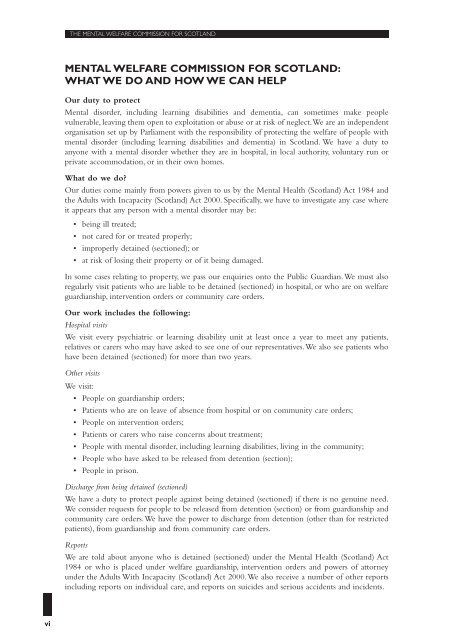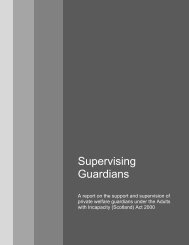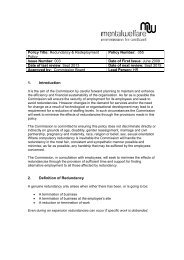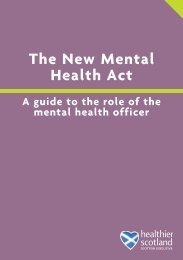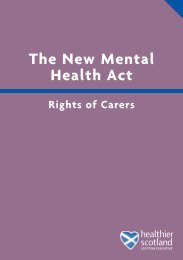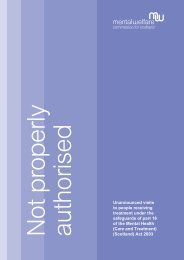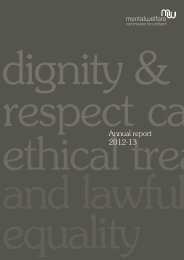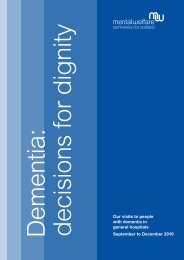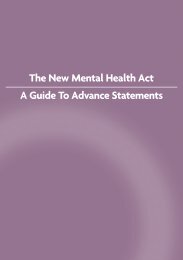v4 Mental Welfare cover - Mental Welfare Commission for Scotland
v4 Mental Welfare cover - Mental Welfare Commission for Scotland
v4 Mental Welfare cover - Mental Welfare Commission for Scotland
Create successful ePaper yourself
Turn your PDF publications into a flip-book with our unique Google optimized e-Paper software.
THE MENTAL THE MENTAL WELFARE WELFARE COMMISSION COMMISSION FOR SCOTLAND FOR SCOTLANDMENTAL WELFARE COMMISSION FOR SCOTLAND:WHAT WE DO AND HOW WE CAN HELPOur duty to protect<strong>Mental</strong> disorder, including learning disabilities and dementia, can sometimes make peoplevulnerable, leaving them open to exploitation or abuse or at risk of neglect.We are an independentorganisation set up by Parliament with the responsibility of protecting the welfare of people withmental disorder (including learning disabilities and dementia) in <strong>Scotland</strong>. We have a duty toanyone with a mental disorder whether they are in hospital, in local authority, voluntary run orprivate accommodation, or in their own homes.What do we do?Our duties come mainly from powers given to us by the <strong>Mental</strong> Health (<strong>Scotland</strong>) Act 1984 andthe Adults with Incapacity (<strong>Scotland</strong>) Act 2000. Specifically, we have to investigate any case whereit appears that any person with a mental disorder may be:• being ill treated;• not cared <strong>for</strong> or treated properly;• improperly detained (sectioned); or• at risk of losing their property or of it being damaged.In some cases relating to property, we pass our enquiries onto the Public Guardian.We must alsoregularly visit patients who are liable to be detained (sectioned) in hospital, or who are on welfareguardianship, intervention orders or community care orders.Our work includes the following:Hospital visitsWe visit every psychiatric or learning disability unit at least once a year to meet any patients,relatives or carers who may have asked to see one of our representatives.We also see patients whohave been detained (sectioned) <strong>for</strong> more than two years.Other visitsWe visit:• People on guardianship orders;• Patients who are on leave of absence from hospital or on community care orders;• People on intervention orders;• Patients or carers who raise concerns about treatment;• People with mental disorder, including learning disabilities, living in the community;• People who have asked to be released from detention (section);• People in prison.Discharge from being detained (sectioned)We have a duty to protect people against being detained (sectioned) if there is no genuine need.We consider requests <strong>for</strong> people to be released from detention (section) or from guardianship andcommunity care orders.We have the power to discharge from detention (other than <strong>for</strong> restrictedpatients), from guardianship and from community care orders.ReportsWe are told about anyone who is detained (sectioned) under the <strong>Mental</strong> Health (<strong>Scotland</strong>) Act1984 or who is placed under welfare guardianship, intervention orders and powers of attorneyunder the Adults With Incapacity (<strong>Scotland</strong>) Act 2000.We also receive a number of other reportsincluding reports on individual care, and reports on suicides and serious accidents and incidents.vi


